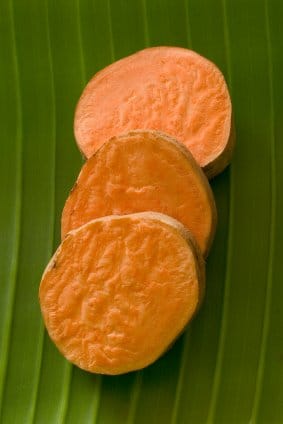Spring is in full swing here in Seattle. Flowers and trees have been in bloom for some time, but the surest sign of the season is streets crowded with sun-deprived runners and cyclists sans rain gear.
As we enter “the magic time” in the Pacific Northwest (well, almost…) – dry, 14-hour days filled with sun-drenched waterfronts, gentle breezes, and warm-but-not-sweltering temperatures – I’m training for my third endurance race, the Seattle Rock n Roll Half Marathon on June 23.
Maximizing my energy jumps to the top of my priority list when I’m running up to 26 miles a week (plus yoga, Pilates, and strength training in between). Whatever your workout or sport, these “energy-packed eats” will help you maintain steady energy throughout the week and boost it during your toughest workouts.
- Whole grains: “Whole grain” cereals are so heavily processed that they barely resemble the grains they came from (or the nutritional profile of those grains). Go to the source by turning the real deal – like whole oats oatmeal, brown rice, quinoa, amaranth, millet, or farro – into sweet breakfast cereals or savory side dishes. Your body needs the fast energy of carbs during heavy training cycles. Stick with unprocessed grains for the biggest and most sustained boost. Oh, and by the way, whole grains are good sources of protein too. (Yep.)
- Nuts: A handful of nuts is a great quick energy source just before a workout. Here’s a list of nuts with the highest nutrient density (including protein) for the least amount of saturated fat.
- Eggs: I eat eggs pretty sparingly in general, but sometimes find that having one (or some egg whites, which cuts out the saturated fat) before a particularly tough workout keeps me going a little longer. Experiment and see what works for you.
- Fresh fruit and vegetables: Load up on fresh fruit and veggies for a low-calorie source of carbohydrates. Most sports nutritionists recommend a daily carb intake of 60 – 65% during training or heavy workout cycles. Fresh produce will help you get that in without feeling heavy and sluggish.
- Lean protein: I stick with fish, poultry, and beans to keep saturated fat to a minimum. Aim for 10 – 15% of daily intake from protein.
- Ground chia seed: It’s a “superfood” for a reason. Packed with protein, fiber, and a good balance of essential fatty acids (omega-3 and omega-6), chia gives you more nutritional bang for your buck. Add a spoonful to smoothies or oatmeal for a nutty flavor similar to flax seed.
- Sweet potatoes: Yummy, starchy sweetness! Sweet potatoes are a great source of potassium, iron, and manganese – minerals that you’ll need if you’re working out hard. Try them baked with a sprinkle of walnuts and cinnamon – great for breakfast or a snack.
- Fluids: Hydrate! Hydrate! Hydrate! Even on non-training days, consistent hydration is a key part of keeping your energy up on your tough workout days. Try coconut water or Nuun for electrolyte replacement and good ol’ H2O for general hydration. (Note about coconut water: It doesn’t have much sodium, so be sure to eat something salty too if you use it for electrolyte replacement after a tough workout.)
- Larabars: Still my favorite on-the-go snack for pre- or post-workout…and that’s saying a lot! I’ve tried virtually every “energy bar” on the market, and I always come back to the simplicity of Larabars. (Yes, I recognize the irony.) Just nuts + fruit – nothing more. Yum!
- Avocado: A great source of potassium and unsaturated fat (can you say happy heart?!), avocado is a yummy addition to your training diet. Fats should make up about 25% of your daily diet when you’re training, so avocados are an easy way to get the healthy fat. I slice or spread it on a piece of multigrain toast and add a sprinkle of salt and pepper for a satisfying post-run snack. If you want something a little more interesting, try this Avocado Breakfast Sandwich.
- Pancakes! Okay, not exactly what you want to eat before a half marathon, but after? Ummm, YES!! Try my Blueberry Oatmeal Almond Ginger Pancakes: Carbs to replenish you; nuts with “good fat” and protein to fill you up; and ginger to keep the inflammation down. What could be a better “recovery meal”? 🙂
What foods do you use to keep you going for workouts or sports training? Share your tips and recipes in the comments.






